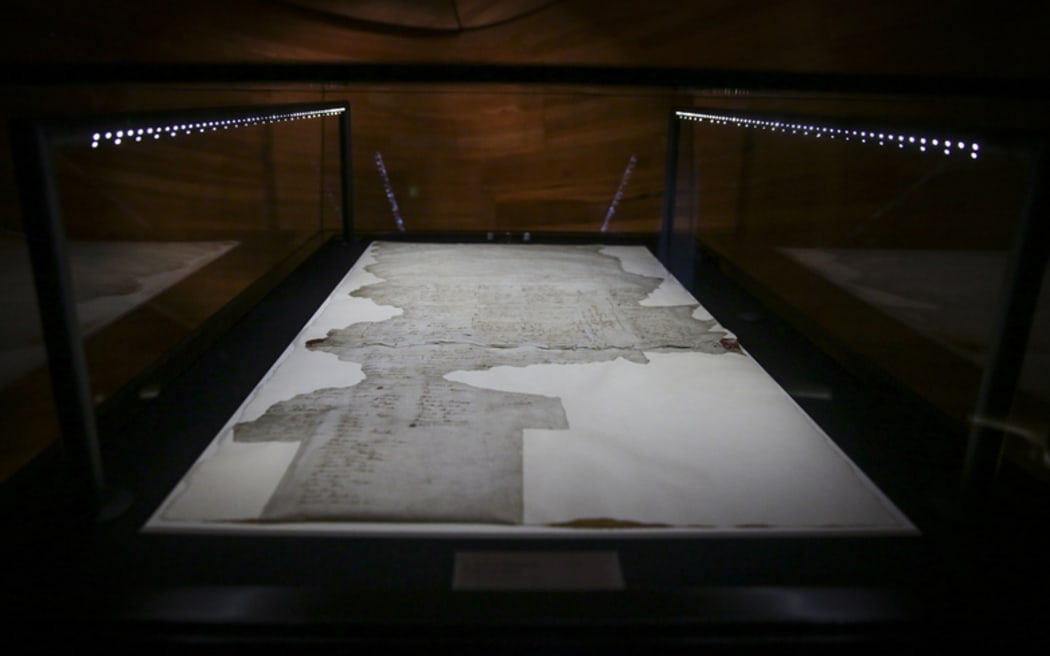
Photo: RNZ / Rebekah Parsons-King
A poll commissioned by the New Zealand Human Right Commission has found that 70 percent of New Zealanders want decisions around Te Tiriti o Waitangi to be done on an equal footing between Māori and non-Māori.
Horizon Poll found a majority thinks Te Tiriti applies to everyone in Aotearoa with 80 percent of New Zealand adults believing that respectful discussion of racial issues is also important.
Professor Claire Charters, the commission's Rongomau Taketake (Indigenous Rights partner), said the survey's findings are about promoting equality and a healthy relationship between communities.
"We commissioned Horizon to undertake this poll, and I guess that really falls out of the Human Rights Commission sort of mandate to promote healthy relationships based on equality here in Aotearoa - it is also in line with our legislative role to promote a better understanding of the human rights dimensions opportunity."
Discussions around the Te Tiriti have become more fraught since the election with both Act and NZ First expressing scepticism or proposing changes that could fundamentally alter how New Zealand's founding document is interpreted by the courts.
While National have ruled out a referendum, Māori community leaders and politicians have warned of the possibility of civil disobedience over any moves to change the current consensus.
Charters said that the survey is about understanding more broadly what New Zealanders think about Te Tiriti while accepting there was a more nuanced link between the current political rhetoric and public thinking.
"Clearly, it's an important issue and as the Human Rights Commission, it's important that we are trying to promote good healthy relationships. So, this is certainly related I guess, but you know, it's part of a wider mandate of the Human Rights Commission to understand the human rights dimensions.
"It's an important political issue and it's important that the Human Rights Commission can provide this sort of human rights lens on this debate," she said.
While the survey show broad support on some issues there was a divergence in views on co-governance with 49 percent agreeing that Māori should manage issues and be involved in making decisions that affect minorities.
Charters said that context was important in the numbers and that respectful discussions around the debate were also important.
"That was the majority, the majority of the highest number of those polled agreed with that and you know it is also this this idea that you need respectful discussions, 80 percent agreed that you need respectful discussions, and the majority did not want politicians inflaming race relations by using this issue in that way.
"So you have to understand I guess these statistics and their wider context."
Chief Human Rights Commissioner Paul Hunt said on publication of the report, "while the government of the day could propose something like a referendum on how Te Tiriti is applied, such a move needs to be with the agreement of its treaty partner, Māori.
"People generally want decisions around Te Tiriti to proceed with care, and that can happen when government treats its treaty partner as an equal.
"People need to understand that Te Tiriti benefits everyone in Aotearoa."
Other findings
The survey found that 83 percent believe that is important that everyone knows New Zealand's history and while 58 percent felt informed about Te Tiriti o Waitangi 32 percent did not.
Only 13 percent have read Te Tiriti o Waitangi (te reo Māori version), and 23 percent have read the English translation of the Māori text.
Overall, 32 percent haven't read any version or summary of The Treaty / Te Tiriti.



